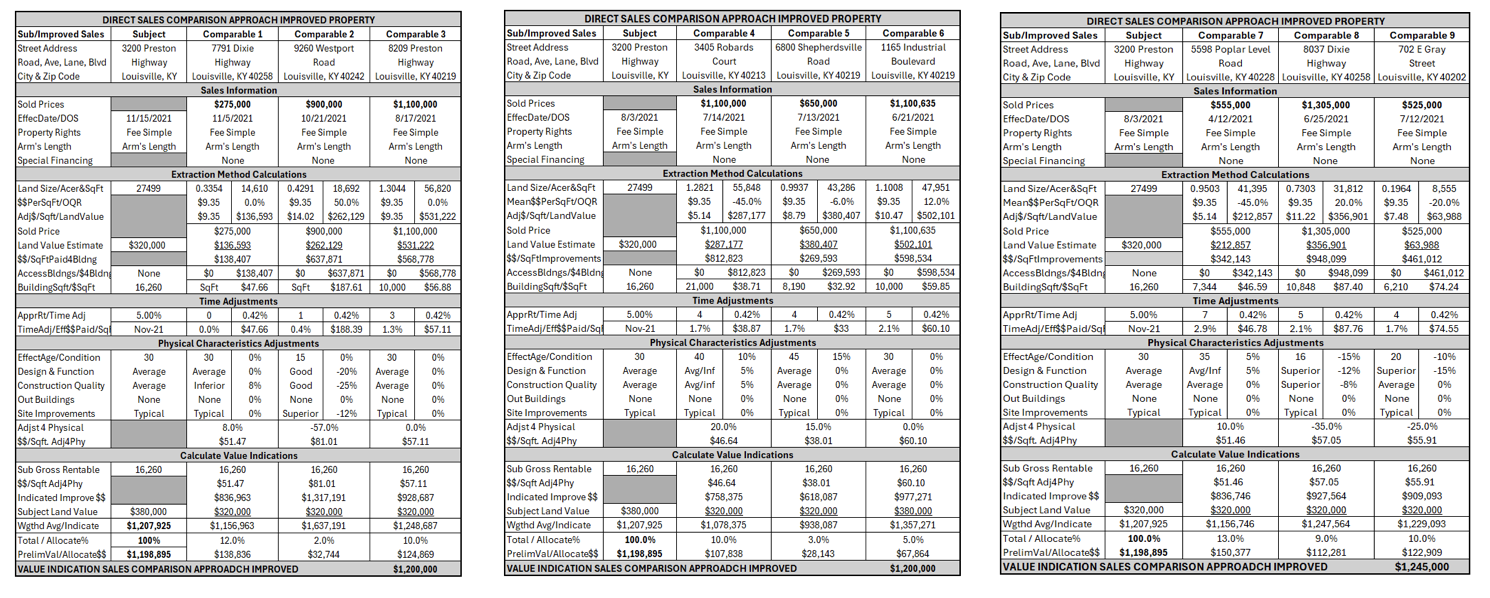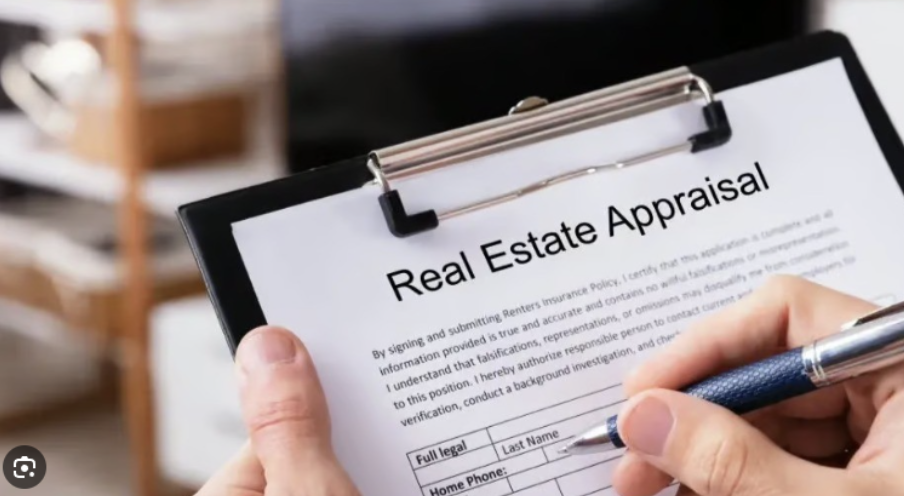Every appraisal is completed to complete a specific need. There is always a reason or a goal why a property value is needed. Examples of this can be Mortgage Lending Purposes, Tax Appeal, Estate Settlement, Estate Planning, Divorce, Buying, Selling, Listing with a Realtor, Investment Decisions, Business Disputes, Insurance Claims, and Insurance CoverageThe type of appraisal needed will be based on a number of factors including the Purpose the appraisal will be used for.
The Intended Use of an Appraisal is the purpose of the appraisal report, while the intended user is the person or party that will rely on the appraisal's conclusions: Intended useThe purpose of the appraisal report, such as refinancing or mortgage financingIntended User
The person or party that will use the appraisal report's conclusions and analysis The appraiser is responsible for identifying the intended use and intended user of an appraisal assignment. The appraiser should communicate with the client to identify the intended user. The client is always an intended user, but not all intended users are clients. Other common intended users include heirs, attorneys, banks, insurance agents, and the IRS.

Clearly identifying the intended use and user of an appraisal report is important for several reasons:
• It helps protect the appraiser and intended user from unauthorized users.
• It helps the appraiser understand the problem to be solved and their reporting responsibilities.
• It helps the appraiser avoid testifying in court or answering questions about the appraisal report in front of others.
The Intended Use of an Appraisal is the purpose of the appraisal report, while the intended user is the person or party that will rely on the appraisal's conclusions: Intended useThe purpose of the appraisal report, such as refinancing or mortgage financingIntended User
The person or party that will use the appraisal report's conclusions and analysis. The appraiser is responsible for identifying the intended use and intended user of an appraisal assignment. The appraiser should communicate with the client to identify the intended user. The client is always an intended user, but not all intended users are clients. Other common intended users include heirs, attorneys, banks, insurance agents, and the IRS.

First and foremost, the type of appraisal needed will depend upon the specific Property Type. Beyond this factor, there are two primary concepts which must be understood, at the outset, in order to determine the Appraisal Type, and the price, or cost of an appraisal. Those factors are Appraisal Development & Appraisal Reporting.
Regarding Appraisal Development there are two categories which appraisal development falls into:
Complete Appraisal: This level is thorough and meets the highest standards of professional development. In cases where there is expected to be mortgage financing and the lender expects to use the appraisal for such, only a Complete Appraisal will suffice. Courts accept Complete Appraisals, and nothing less.
Limited Appraisal: In certain cases, a client may not need a Complete Appraisal. Motivated by frugality, or cost savings, he or she may opt for the Limited Appraisal, which takes the appraiser less time to Develop, and as a result costs less than the Complete Appraisal. If a property owner needs a general idea of the value of a certain property because he or she is having his or her wills updated, a Limited Appraisal may be sufficient.
Each of these considerations have their own specific purposes. A Limited Appraisal can benefit a property owner by cost savings, as the Limited Appraisal takes the appraiser less time to Develop and less time spent Report Writing, resulting in a lower appraisal fee.
Customarily Bluegrass Industrial Appraisal completes commercial and industrial real estate appraisals in Louisville, Kentucky and the surrounding areas, Complete Appraisals are far more commonly ordered than Limited Appraisals.

In contrast to a Complete Appraisal, a Limited Appraisal is not required to meet the highest standards of appraisal development. This type of Appraisal Development is not comprehensive.

Differences difference between the Complete Appraisal and the Limited Appraisal include:
In the case of the Complete Appraisal the appraiser is required to develop the appraisal based on the specific industry guidelines contained withing Standards 1 & 2 of the Uniform Standards of Professional Appraisal Practice (USPAP) manual, together with certain industry governing bodies such as The Appraisers Standards Board for the state where the property resides.
Regarding a Limited Appraisal, the Level of Development can be agreed to between the appraiser and the client. The purpose of Limited Development is to reduce the cost of the appraisal.
The commercial and industrial appraisal market customarily prefers Complete Appraisals communicated in Summary Reports. We estimate about 2% or 3% of our clients prefer the cost saving option of the Limited Appraisal.
The Complete Appraisal stands in contrast to the Limited Appraisal.
A Complete Appraisal omits nothing from the recognized appraisal process. The appraisal process, procedures, standards, and codes of ethics are encapsulated within the pages of the following documents, agencies guidelines and congressional acts:
In a Complete Appraisal, the only recognized steps which are excluded are steps which are not relevant to a particular property, market or assignment.
Every applicable, recognized method, or procedure, relevant to a certain property type, or market, is included in the Complete Appraisal.
To identify the level of appraisal completed as a Complete Appraisal indicates the following:
Other aspects of the Complete Appraisal are:
In addition to the summary, brief and minimal reporting options another type of report which can save the client significant costs are appraisals completed on standardized forms. The following are reporting options with their respective property types listed. For example, when having a large land tract appraised the Standard Form NL – Land 5/2007, Summary Report can be completed as a significant cost savings when compared to Narrative Report Options. Below is a list of examples of commonly utilized Standardized Reporting Forms. If cost savings is one of your objectives, ask us to tell you how we might be able to save you significant costs by completing your next appraisal report on a Standardized Report Form.
Commercial Development Land; Standard Form NL - Land 5/2007; Summary Report
Single Family Residential; 1004 URAR; Summary Report
Residential Condominium; Standardized Form FNMA Form 1073
Commercial Condominium; Standard Form FNMA Form 1073
Manufactured Home; Standard Form FNMA Form 1004C
Multi-Family 2-4 Unit; Standard Form FNMA Form 1025
Appraisals for mortgage lending are completed by independent, certified, professional real estate appraisers who must have specialized knowledge of the specific property type and location of the property being appraised. The appraisal report is delivered directly to the lender, not the property owner. The report expresses the appraiser’s opinion of a property's fair market value.
This type of appraisal serves to help the lender ensure the property is sufficient collateral for the loan, examining factors like the property's condition, size, features, and comparable recent sales in the local market. Key Aspects of a Mortgage Appraisal are:
INDEPENDENCE I OBJECTIVITY: The appraisal is conducted by a licensed appraiser, a neutral third party, providing unbiased valuation.
DETERMINATION OF MARKET VALUE: The goal is to establish a reliable estimate of what the property would likely sell for in the current real estate market.
COLLATERAL FOR THE LOAN: The primary purpose for the lender is to confirm that the home's value is sufficient to cover the loan amount, protecting their investment.
COMPREHENSIVE ANALYSIS: The appraiser will consider many factors, including:
PROPERTY DETAILS: Size of the house and lot, number of bedrooms and bathrooms, age, and overall
condition.
PHYSICAL FEATURES: Quality of construction, finishes (like countertops and flooring), appliances, and structural components such as the foundation and roof.
Location: Neighborhood characteristics, market trends, and the general desirability of the area.
Comparable Sales: Analysis of recent sales of similar properties in the local market to help determine value.
WRITTEN REPORT: The appraiser compiles their findings into a written report, often using a standardized form like the Uniform Residential Appraisal Report, to present their valuation to the lender.
LENDER REQUIREMENT: The mortgage lender typically requires this appraisal to be conducted before approving the loan, and they often pass the cost to the borrower.
BORROWER’S RIGHT TO A COPY: You are legally entitled to receive a copy of any appraisal report the lender obtains to support your loan decision.
Similar to divorce cases, when there are real property assets to be divided, and particularly in cases of contested disillusionments, real estate appraisal is a critical component.
In such cases seldom is reasonable to consider one appraiser to complete a single valuation that could be used to satisfy the partitioning of the real property assets.
Judges are not typically favorable towards the single appraisal concept in business disputes. In these situations, it is always better, at the outset of any business dispute have separate appraisals, one for each partner. This eliminates a number of problems going forward.
It is important to understand that although the appraiser may be under a contract to perform an appraisal for one or the other party. But his or her obligation is always to the truth.
The appraiser never represents the financial interests of any party. The appraiser’s job is to be an impartial professional who provides an opinion of market value for the marital real property holdings.
Best case scenario, two separate appraisals are obtained, one for each party and when the two appraisals are compared to one another, they are relatively similar, proving, and supporting a reliable and credible appraisal value for each property.
The number of times Bluegrass Industrial Appraisal has been contracted to complete this type of appraisal is very few. However, if a client is in need of these types of services, we are more than happy to accommodate that need.

In the case of divorce, when there are real property assets to be divided, and particularly in cases of contested divorces, real estate appraisal is a critical component.
In uncontested divorce it is reasonable to consider one appraiser to complete a single valuation that could be used to satisfy the partitioning of the real property assets.

In many cases, judges can be relatively favorable towards the single appraisal concept. The primary benefit of this is to cut the total appraisal fee for each party in half.
A common problem, however, is that many appraisals which begin with the intent of being uncontested eventually become contested. At that point, the original appraisal is often considered null and void and two additional appraisals from two separate and new appraisers must be obtained.
This concept works in opposition to the original goal of lower the total cost of the appraisal component.
In my experience it is better, at the outset of any divorce, to have a separate appraiser for each party. This eliminates a number of problems going forward.
It is important to understand that although the appraiser may be under a contract to perform an appraisal for one or the other party. But his or her obligation is always to the truth.
The appraiser never represents the financial interests of any party. The appraiser’s job is to be an impartial professional who provides an opinion of market value for the marital real property holdings.
Best case scenario is that there are two appraisals, one paid for by each of the two parties. When the two appraisals are completed and compared to one another, they are relatively similar, proving, and supporting one another.
Regarding appraisals for purchases, most buyers consider the appraisal to be a formality to be ordered by the lender, on the lender’s behalf.
As an appraiser I have often thought many buyers are missing an opportunity to order their own independent appraisal, completed for them, with them being the client and the sole Intended User.
On occasion, usually when the buyer is paying cash and there is no lender requiring an appraisal, a purchaser contracts with us to complete a preliminary appraisal to ensure their equity is protected.
Typically, this is done if there is an appraisal contingency written into the sales contract.
This is sometimes the case with regard to commercial and industrial properties as well.
However, too often, it seems, buyers who are paying cash opt not to hire a professional appraiser, moving forward based on their own opinion of value.
This carries similar risks as purchasing an older property without getting an inspector to complete detailed inspections of the system and superstructure.
At Bluegrass Industrial Appraisal we are happy to contract with buyers prior to their purchase offers of subsequent to the executed contract.
We recommend cash buyers include an appraisal contingency in their offers to purchase. This is insurance on their equity.
The Louisville Metropolitan Statistical Area includes virtually every type of commercial and industrial real estate investment property types.
In real estate appraisal, the Highest & Best Use analysis determines the property's most profitable and probable use by evaluating if it is physically possible, legally permissible, financially feasible, and maximally productive. This analysis identifies the specific use that would generate the greatest value, ensuring the property is valued for its highest potential return on investment, not necessarily its current use.
The Four Primary Factors to consider are as follows:
The first step in the analysis is for the appraiser to complete the analysis of the land, considering it as if it were vacant. The second step is considering the land as it is currently improved.
By applying these tests, the Highest & Best Use analysis provides a foundational step in the appraisal process.

Over the years we have completed hundreds of appraisals for real estate investors who want my opinion and my expertise prior to making a large purchase on an investment property.
This can prevent an investor from having the unfortunate experience of overpaying on an investment or worse, buying a property they would be better off passing on.
On numerous occasions we here at Bluegrass Industrial Appraisal have provided the sobering facts of a would be investment, and as a result the investor walking away and at the same time saying, “Thanks! I really dodged a bullet on that one” So to speak.
The professional appraisal can also be an invaluable tool when helping an investor make purchasing decisions, or using the appraisal for negotiating leverage on overpriced properties.
The Louisville Metropolitan Statistical Area includes virtually every type of commercial and industrial real estate investment property types.

Over the years we have completed hundreds of prelisting & post listing appraisals for real estate agents.
So often Realtors contact us because they have a poor performing listing, and they want to get a professional appraisal to demonstrate to the seller that a significant downward price adjustments is necessary.
This can prevent an agent from having the unfortunate experience of losing a listing they have worked on for months.
Countless times a price adjustment has been achieved on a formerly overpriced listing, allowing the agent an additional 2 or 3 month listing extension. The result being a closing and check cut to the agent for thousands of dollars they would have otherwise missed out on had they not has the wherewithal to obtain an appraisal from us.
In many cases real estate agents do not need an appraisal to properly price their listings. However, some properties are too unique and/or too complicated, and a professional appraisal is a prudent step for them to ensure getting to the closing table.
The professional appraisal can also be an invaluable tool when helping a property owner be more realistic and not blame the agent for the lack of serious market interest in their property.
Within the Louisville, Kentucky market area Bluegrass Industrial Appraisal, a division of Appraisal KY, LLC has worked with hundreds of Realtors, helping them achieve their goals by providing expert appraisals reports, consulting and advice.

A real estate appraisal for a tax appeal is a detailed, professional valuation used to argue that a property's assessed value is unfairly high. The appraisal serves as a crucial piece of evidence to prove that the fair market value of your property is lower than the amount your local tax assessor claims.

Tax appeals differ from other appraisals. Appraisals for tax appeals, known as "retrospective appraisals," have a different focus and level of scrutiny than those for mortgage or refinancing purposes.
PURPOSE: A mortgage appraisal establishes a conservative value to protect the lender from risk. A tax appeal appraisal is designed to provide a well-documented, defensible value opinion for an appeal board.
DATA & EVIDENCE: In a tax appeal, the appraiser must be prepared to formally testify and defend every detail of their valuation. This means providing data that justifies adjustments for things like property condition, upgrades, and recent comparable sales.
RELEVANT DATE: The valuation date is the specific date used by the tax assessor, which is often January 1 of the tax year. The appraiser must research the market and comparable sales activity around this specific date.
Estate Appraisals are a fundamental part of estate settlement and financial planning. They serve to establish the fair market value of an individual's assets, ensuring that assets are distributed according to legal and testamentary requirements.
Estate appraisals must be completed by licensed or certified real estate appraisals who have expertise in the specific type of properties included in the estate. The purpose is to establish the fair market value of the property, as of the date a will is file or as of the date of death. This value can be used for a number of purposes including:
ESTATE TAX COLLECTION: The value of the real estate holdings of the estate, to determine property values to calculate federal and/or state estate taxes owed.
PROBATE: This is the legal process of administering a deceased person’s estate.
DISTRIBUTION OF ASSETS: Having a professional appraisal in the file supports the stated value/s of real estate holdings to ensure that assets are distributed fairly among the heirs or beneficiaries according to the will or state law. And to estimate estate taxes.
An Insurance Claims Appraisal is an appraisal completed either at the request of an insurance company or an insured person. In most cases it is an attempt to stay in an out-of-court status, seeking a dispute resolution process.
This type of appraisal is often used when a policyholder and their insurance company disagree on the value of a covered loss or the cost to repair/replace damaged property.
Typically, each party, the insurance company, and the insured or property owner, selects an independent, impartial appraiser to complete an independent professional appraisal.

The appraiser is tasked with representing the truth and facts, and does not represent either side in the dispute.
The two appraisers each submit their reports for the parties to consider and if necessary a judge or arbitrator may have to decide the validity of one or both of the appraisal report.
The appraisal process specifically determines the value of the real estate, not issues of coverage or liability
Although we have received very few of these types of appraisal assignments over the years, there are, on occasion, times when a property owner believes he is underinsured and his or her insurance company is unwilling to increase the maximum allowable payout.
In this type of appraisal, the client’s goal is to obtain an appraisal which would compel the insurance company to increase coverage limits for a particular building or set of building improvements.
Although this type of appraisal is rare in our office, we do complete them if a client has such a need.